Services on Demand
Journal
Article
Indicators
-
 Cited by SciELO
Cited by SciELO -
 Access statistics
Access statistics
Related links
-
 Similars in
SciELO
Similars in
SciELO
Share
Revista Lusófona de Estudos Culturais (RLEC)/Lusophone Journal of Cultural Studies (LJCS)
Print version ISSN 2184-0458On-line version ISSN 2183-0886
RLEC/LJCS vol.9 no.2 Braga Dec. 2022 Epub May 01, 2023
https://doi.org/10.21814/rlec.3989
Varia
Leisure & COVID-19: Forbidden Bodies and Changes in Leisure Dynamics in the Cities of Maia (Portugal) and Curitiba (Brazil)
1Centro de Línguas, Literaturas e Culturas, Universidade de Aveiro, Aveiro, Portugal
2Centro de Literaturas e Culturas Lusófonas e Europeias, Faculdade de Letras, Universidade de Lisboa, Lisboa, Portugal
3Universidade Federal do Paraná, Curitiba, Brasil
This article intends to place, at the heart of a critical, political, and theoretical reflection, the changes in urban leisure dynamics, namely in the cities of Maia (Portugal) and Curitiba (Brazil), the fruit of the COVID-19 pandemic. We believe, through the lens of cultural studies, that COVID-19 constitutes an essential and unique opportunity to understand human phenomena around an extreme health situation that triggered biopolitical processes and technological control mechanisms in the mobility and leisure of bodies and continues to do so. This article highlights how the pandemic has blurred the domestic, work, and leisure boundaries, much to the service and benefit of the neoliberal and capitalist systems. Our methods combined ethnographic collection (conducted from March 2020 through June 2021), qualitative data analysis, and theoretical contributions by Foucault (1979/1998, 1996/1999, 1975/2002, 1994/2006, 2010a, 1976/2010b), Deleuze (1992, 1995), Certeau (1980/1994, 1993/1995), Haraway (1997, 2018), Braidotti (2020) and Mbembe (2003/2018) in a very particular articulation with the locus, the social and political context of the spaces and the pandemic consequences acting in a very specific and insidious way in each one. We were able to verify that, in the pandemic, leisure is (re)claimed and valued as a fundamental right in the face of regulation, control, and discipline over bodies. Data indicate that subjects reclaim their lost mobility and space, challenging the order, law, and authority put in place. A pertinent theoretical and empirical articulation was also evidenced between the sanitary policies in place and the observed disruptive and subversive performances, which show, in time and space, a gradation and progression of the subversion of bodies in leisure parks, which are privileged loci of freedom.
Keywords: leisure; COVID-19; pandemic; body; public policy
Este artigo pretende colocar no cerne de uma reflexão crítica, política e teórica as alterações nas dinâmicas de lazer urbano, nomeadamente, nas cidades da Maia (Portugal) e Curitiba (Brasil), fruto da pandemia de COVID-19. Consideramos, sob a lente dos estudos culturais, que a COVID-19 constitui uma oportunidade fundamental e única para compreender os fenómenos humanos em torno de uma situação sanitária limite que acionou e continua a acionar processos biopolíticos e mecanismos de controlo tecnológico na mobilidade e lazer dos corpos. Este artigo destaca a forma como a pandemia diluiu as fronteiras entre o doméstico, trabalho e lazer, muito em serviço e benefício do sistema neoliberal e capitalista. Recorrendo a uma recolha etnográfica (realizada entre março de 2020 e junho de 2021), à análise qualitativa de dados e aos contributos teóricos de Foucault (1979/1998, 1996/1999, 1975/2002, 1994/2006, 2010a, 1976/2010b), Deleuze (1992, 1995), Certeau (1980/1994, 1993/1995), Haraway (1997, 2018), Braidotti (2020) e Mbembe (2003/2018) numa articulação muito particular com o locus, o contexto social e político dos espaços e as consequências pandémicas que atuam de uma forma muito específica e insidiosa em cada um dos espaços, foi possível verificar que o lazer é, na pandemia, (re)valorizado e reivindicado como direito fundamental em face da regulação, controlo e disciplina dos corpos. Os dados indicam que os sujeitos reclamam a mobilidade e os espaços perdidos, desafiando a ordem, a lei e a autoridade implementadas. Evidenciou-se, igualmente, uma pertinente articulação teórica e empírica entre as políticas sanitárias implementadas e as performances disruptivas e subversivas observadas, que apresentam, no tempo e no espaço, uma gradação e progressão da subversão dos corpos nos parques de lazer, locus privilegiado da liberdade.
Palavras-chave: lazer; COVID-19; pandemia; corpo; políticas públicas
1. COVID-19: “The China Plague”
No one could foresee that entering the second decade of the 21st century would bring a pandemic capable of violently altering and shaking the daily lives of everyone without exception. In this century, the world experienced its second pandemic. However, it was the most serious and with greater social, economic, and political implications. COVID-19 joins the album of pandemics as one of the greatest trials and tests to humanity since the bubonic plague, smallpox, cholera, swine flu (H1N1), and the Spanish flu, which was also assigned a nationality.
Even though the origin of the new coronavirus is still unknown, the ideological war, the global political conflict, the hegemonic influence of Western policies, and the far-right political movement dictate the locus for the strongest and the weakest. They assign nationalities to viruses, convey information about conspiracy theories involving virus fabrication, and minimize COVID-19’s deadly and harmful influence on the life and death of humanity. A “democratic virus” that cares not about age, profession, social or economic status. A few news agencies broadcasted that the new coronavirus first appeared in a popular market in Wuhan province, China. As the appeals of voices, confined and hopeful for the future echoed from the domestic space and disseminated throughout neighborhoods, cities, countries, and the world, symbolized by a rainbow postulating that “andrà tutto bene” (everything will be fine), discordant and dictatorial cries assigned, in an intense geopolitical contest, a stigmatizing nationality to the new coronavirus and its various variants or strains: “China virus”, Amazon, British, South African, Californian, Mexican, Filipino and Indian strains or variants1. Donald Trump (Trump Volta a Culpar China por “Deixar a Praga Escapar” e Troça de Biden por Usar Máscara, 2020), Mike Pompeo (Mike Pompeo Afirma que Existem “Imensas Provas de que Coronavírus Vem de Laboratório em Wuhan”, 2020), Aleksandr Lukashenko (Lopes, 2020), Jair Bolsonaro (“Da ‘Gripezinha’ à Imunidade do Brasileiro: Dez Momentos em que Bolsonaro Desvalorizou a Covid-19”, 2020) jokingly dubbed the coronavirus as “the Chinese plague”2, a fanciful “little flu”, “the Chinese virus” “created in a laboratory in Wuhan” that can be cured with “vodka” or with the “miraculous” chloroquine. They condoned the spread of misinformation and fake news, even declining any responsibility for the disastrous, harmful and genocidal management of the pandemic or the implementation of strategies to combat the high mortality rates registered in the United States of America (Trump administration) and in Brazil (Bolsonaro administration): a genocidal necropolitical strategy of letting people live or die, or, if we want to be more crudely theoretical, indirect murder as mentioned by Rosi Braidotti (2020), Achille Mbembe (2003/2018) and Michel Foucault (1979/1998, 1976/2010b), which serves more obscure and less humane interests.
The action and (in)action of countries with negationist governance in the face of the pandemic scenario is the clear expression of a practice of sovereign power, technologically mediated, “capable of dictating who can live and who should die ( … ). To be sovereign is to exercise control over mortality and define life as the implantation and manifestation of power” (Mbembe, 2003/2018, p. 5). In the pandemic context, it is not a matter of eliminating enemies of the state but, by naturally biological means, eliminating, through inaction, incompetence, and/or necropolitical strategy, those individuals who are less economically interesting or who do not serve the neoliberal and capitalist machine or dynamic of the states.
During the first phase of the pandemic, the effects of COVID-19 were clearly devastating, not only in the body of those affected by the disease but also in their loved ones, still mourning irreparable losses in the process of inhuman grief, irrational and (un)real pain, while watching the demonstrations of pandemic deniers.
In the first months of the pandemic, the social, personal, political, and economic effects of the total confinement of bodies and minds were visible and of unprecedented magnitude: economic recession, political instability, a sharp rise in unemployment and food aid, obesity, depression, domestic violence, increased domestic workload and stress associated with unequal task distribution (Bonalume, 2020; Coelho et al., 2021; Instituto Nacional de Estatística, 2021; Teixeira et al., 2022; United Nations, 2020; World Health Organization, 2022a, 2022b).
In Portugal, the state of emergency was in force from March 18, 2020, to April 30, 2021, and in Brazil, from February 4, 2020, to May 22, 2022. COVID-19 has caused big changes not only because of the way policies protected, forbidding the mobility of individuals’ bodies but also because of the way these subjects appropriated the measures and subverted them, the law and rules, on behalf of the fundamental right to leisure - which, interestingly, is markedly absent as a fundamental right in the Constitution of the Portuguese Republic (Constituição da República Portuguesa, 1976) and present in the Constitution of the Federative Republic of Brazil (Constituição da República Federativa do Brasil de 1988, 1988). Indeed, within this absence in Portugal, we realized the need for leisure as a fundamental right in pandemic and confinement contexts. Meanwhile, in Brazil, this right is constitutionally guaranteed but, in practice, is not in effect. Thus, we intend to cast a watchful, critical and political eye on the profound changes in leisure dynamics in parks/ecotrails, squares and streets - in this particular case, with the example of Maia ecotrail, Portugal, and São Lourenço Park/bike paths in Curitiba, Brazil. We also intend to analyze the measures implemented, expressions of public power, and regulatory control over bodies (Foucault, 1979/1998, 1976/2010b), as well as phenomena of appropriation/negotiation/implosion of these same measures by its users. Under Foucault’s theoretical paradigm, we intend to interrogate leisure in the pandemic context and its implications for leisure dynamics.
2. Methodology
This research was developed during the decreed of the state of emergency as a result of the COVID-19 pandemic, and for this reason, the temporal context in which this study took place offered us, in real-time, data revealing the impact of COVID-19 and public health policies in the subjects’ leisure practices. The fact that we captured, in loco and in real-time (without direct contact -, i.e., no interview -, due to the high risk of contagion in force during the period in which the study was carried out), the practices of the subjects under the health policies in force at the time and the scientifically and legally reasoned prohibitions, which directly influence their mobility, allowed us to:
reveal the exposure and practices of the subjects regarding the leisure that is crossed and affected by a pandemic;
understand the impact of process and control mechanisms (necessary, in the case of the COVID-19 pandemic) on the bodies and that were, a priori, deeply naturalized and subtle, given the absence of a limiting, unstable and uncertain context;
understand the context marked by its originality, magnitude, and exacerbation, placing the subjects in a matrix of denaturalization when confronted with the new and prominent mechanisms of sanitary and technological control
The pandemic reality, a context of crisis enhancing exceptional or atypical practices, offered a kind of magnifying glass that revealed disruptive practices. Such practices, according to the articulation between the collected data and the available theory, highlight the performance of mechanisms of power over the bodies and the necessary sanitary practices revealed, consequently, processes of resistance to them as defense and claim of the right to public space and leisure. However, although we do not defend these same disruptive practices or resistance to the law and do not stand against mandatory confinement, as cultural scientists, it would be imprudent to neglect this issue or the existence of these practices. The practices observed concerning the sanitary measures adopted do not represent the authors’ personal positions and opinions. This investigation, taking advantage of an ethnographic observation methodology with subsequent qualitative analysis, studies leisure cut across by a limited and unprecedented situation.
To carry out this empirical study, we used ethnographic collection and qualitative analysis of data (Bardin, 1977/2007; Guerra, 2010), which integrated a selection of photos we took during an observation period between March 2020 and June 2021, which covers three distinct contexts: pre-state of emergency, during its enforcement, and the post-state of emergency and vaccination period following the COVID-19 pandemic. Along with a photographic survey in Maia ecotrail/Portugal and Curitiba/Brazil, we mobilized a theoretical framework derived from cultural studies, which interrogates what the photographs express (what is said) and obscure (what is unsaid).
The collection of photographic material was conducted between March 2020 and June 2021. We captured the performances of bodies and the marks they left in the locus of leisure: Maia ecotrail, a part of the former Guimarães railway, about 3,300 m long, in a context of extreme restrictions to mobility. In Curitiba, the option was to perceive such practices in São Lourenço Park, with an area of 203,918 m2 and 9 km of bike paths extending to the city center.
We proceeded with the organization and chronological division of the collected material, articulating it with the policies and decisions adopted in the pre-, during, and post-state of emergency context. The importance of this articulation and configuration became evident not only for the organization of the vast collected data but also because the initial hypothesis suggested the possibility of finding theoretically relevant results concerning the COVID-19 pandemic, allowing us to theoretically explore leisure as a need, a right, and a subversion to the imposed order of confinement, as observed in this study. The data collected in 15 months of observation during the pandemic allowed us to achieve theoretical and empirical saturation (Guerra, 2010; Schnapper, 1999/2000), showing a clear and unmistakable relationship between the observed performance, the gradation or progression in the subversion of bodies, pandemic policies and the theoretical exploration of key concepts such as “biopolitics”, “biopower” and “technological extensions” (Braidotti, 2000; Deleuze, 1992; Foucault, 1979/1998, 1996/1999, 1975/2002; Haraway 1997, 2018; Haraway et al., 1985/2009).
3. Between Two Worlds: COVID-19 in Brazil, a Case of Destruction and Precariousness
Aware of the many differences between Brazil and Portugal, including political, economic, and cultural, we entitled this section “Between two worlds”. We start from the general idea that the crisis is global but generates different local impacts: “it is about distinguishing almost microbial operations that proliferate within technocratic structures and alter its operation by a multitude of ‘tactics’ articulated on the ‘details’ of everyday life” (Certeau, 1993/1995, p. 41). Such operations are distinct between countries, and in this sense, we question how the differences between individuals, cities, nations, and territories practiced in public space are established, coexist, tense, or combine within the globalizing pot of cultures. For the author, we need to ask, “how is it that an entire society is not reduced to this process ( ... ) and what popular procedures (tiny and everyday) play with these mechanisms and do not conform to them, except to change them?” (Certeau, 1980/1994, p. 41).
At the moment, we have a “mutating” virus, with cases occurring randomly, with different impacts that affect, in a slightly milder way, some countries that already had progressive public policies in the structural sphere and whose impacts are quickly resolved. In other more peripheral and unstructured countries, however, these impacts acquire perverse effects, as is the case of Brazil, with the average number of daily deaths rising to 2,390 victims due to COVID-19 (Marins et al., 2021).
These data make us reflect on the extent to which this drastic world experience of COVID-19 separates us into two “worlds”, that is, the world of rich and central countries, with more access to prevention and vaccines versus poor and peripheral countries without access to basic urban structures and vaccines for everyone. We are, therefore, faced with unequal worlds in terms of social well-being. Where in some cases, one chooses between those who must live or die, poor or rich, old or young, information or misinformation, truth or lies, care or lack of attention, democracy or autocracy, control or freedom, among many other ambiguities and tensions brought to light by the current global health crisis.
Brazil is facing acute precariousness, which generates successive and radical transformations in different cities and bodies, altering daily practices and perversely affecting the country’s already dramatic social problems. Such social problems require analyzes related to politics, education, health, science, habits, customs, social and moral norms, basic sanitation, housing, urban planning, leisure, and culture, among others. Thus, there is a clear worsening of problems, accentuated by the current health crisis, which increases and enhances (micro)resistance and appropriation of the different public spaces of leisure (Neca & Rechia, 2020).
Currently, in Brazil, certain political actions and practices reveal the use of a narrative, on occasion, anchored in the denial of the virus lethality, inducing certain populations, especially the working class, with less access to information and carrying social markers of difference such as race, gender, age, ethnicity, and socioeconomic power, into a false idea of security and control over their bodies. It so happens that, at times, the discourses used to validate such negationist policies can end up reinforcing some stereotypes, segregation, impoverishment, and even death in certain groups. We can observe the materialized concept of “necropolitics” in Brazil. We ask: has the state the legitimacy to decide who should live and who should die to maintain economic order in the country (Mbembe, 2003/2018)?
It should also be noted that combined with this concept are the concepts of “biopolitics” and “biopower”, coined by (Foucault, 1975/2002), which will be pointed out and developed in later sections, and demonstrate that power suffered “mutations” during the civilizing process, weakening social relations in modern cities and, mainly, in official narratives. For the author mentioned above, modern civilization has been affected by several transformations in its structures of power and knowledge, for knowledge, the laws and policies have transformed in the course of history, suffered even more impact after the industrial revolution, and accelerated today with radical changes in the “ways of doing” in large urban centers, resulting in questionable government strategies. From this mark, technocracy generated knowledge and strategies aiming to control urban ails, such as agglomeration, cleaning of public spaces, epidemics, organization of the economy, law enforcement, regulation of leisure experiences, and systematic organization of cities and their basic infrastructures. Such aspects simultaneously generated political, economic, and democratic crises, which influence each other, especially in present-day Brazil, not putting an end to conflicts between unequal worlds.
Urban hygiene, from controlling the population’s bodies and daily activities, demonstrates the supremacy of one group over another. In other words, the more established define who should go out to work, which activities are regarded as essential, the days and hours of operation, regulating the work, social and cultural life with decrees, which usually strike the working class more cruelly, their bodies always at risk. For Mbembe (2003/2018), it is evident that “necropolitics is the power to dictate who can live and who should die. The ‘killable’ body is at risk of death at all times” (p. 18). In this sense, in Brazil, some facts of history reinforced the idea that in the name of the power of some, the lives of certain groups can be taken, by disqualifying the person, their bodies, the most vulnerable communities (for example, in Brazil, trivializing and normalizing the 21 years of dictatorship, the 300 years of slavery, the war on drug traffic, urban violence, crime, femicide, among others). This reality strengthens the view that there are subordinate places and that some lives that are “worth less” may be extinct or dehumanized and their bodies discarded.
These policies are underway in Brazil and, unfortunately, widely accepted based on the power exercised by the state and its administrative structures (Castilho et al., 2021). Thus, through the official discourse, such practices have become acceptable, even inducing the exclusion of certain groups.
BBC News Brazil, on July 7, 2020, published a story with the title Relembre Frases de Bolsonaro Sobre a COVID-19 (Remember Bolsonaro’s phrases on COVID-19), which points out the discourses of the state from such categories of analysis as: “the issue of the virus is over-dimensioned”; it’s a “little flu”; “we will all die one day”; “so what?”; “ask your governor”; “no need to panic”, among others. These discourses make it clear that from the beginning of the new coronavirus pandemic, President Jair Bolsonaro has been minimizing and dismissing the seriousness of COVID-19, conveying to the public messages that contradict the global guidelines of health authorities. Thus, more than the problems caused by COVID-19 itself, the pandemic raises questions about political, social, and infrastructural problems, which require debate and reflection.
It should be noted that even though they are subject to certain strategies, individuals articulate gimmicks - come up with other ways to subvert the mechanisms imposed on them - which, to Certeau (1980/1994), are “ways to employ the products imposed by a dominant economic order” (p. 91).
4. COVID-19 and Biopolitics: Forbidden Bodies and Stages
The COVID-19 pandemic clearly and evidently demonstrated that leisure is central to maintaining individuals’ minds and bodies and of a certain social dynamic. Moreover, work/employment has always been hyper-valued, endowed with an essential, even self- defining, importance for individuals - a situation that must be articulated with the market’s neoliberal and capitalist influence, which conceives individuals not just as objects that produce wealth, but also as consumers of products. To Baptista (2016),
free time, non-work time, only becomes of interest to the contemporary economic system, while it can also be an economic activity, with subjects being eternally and constantly summoned to participate in the market, whether as consumers or as producers of goods. (p. 28)
In managing its useful and active time, humanity circulates in a vicious and insidious process fostered by the economic and capitalist system, which is divided between production and consumption. According to Baptista (2016), “western reason has dedicated itself to promote work as an indisputable value, devaluing that other time which opposes it: leisure time” (p. 21).
Free time allows individuals to regain their energies so that, in a moment, the machine-man/body, intensively exploited and tamed (Foucault, 1976/2010b; Lafargue, 1977/2011), may return to production and that, in this fraction of time, may he spend the fruit of his labor, which is even a benefit of the system. The COVID-19 pandemic and the associated regulatory confinement led to the suppression of leisure habits and dynamics that reinvigorated individuals from their physical and intellectual effort, oppressing them, as if since they do not have work or do not find themselves in the usual conditions for production in the market context, they had no right to leisure (Figure 1 and Figure 2).
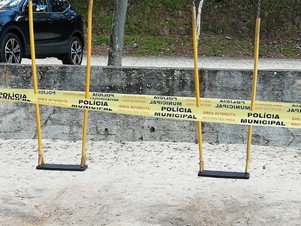
Credits. Fernanda de Castro and Maria Manuel Baptista
Figure 1 Maia ecotrail (Portugal), March 16, 2020, in a period pre-state of emergency (first general confinement
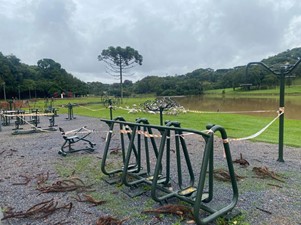
Credits. Simone Rechia
Figure 2 São Lourenço Park (Curitiba/Paraná/Brazil), in May 2020. Under red flag (high risk of COVID-19 contagion)
With the coronavirus pandemic, the tension between capital, work, and leisure, not only through political sovereignty but also through the influence of the power of capitalism, clearly shows how power relations affect our lives. We understand that, in a context oppressive of individual freedoms, individuals act as if, consciously or unconsciously, they recognize the importance of leisure in their lives and their bodies: to suspend leisure is a real assault on the dynamics of individuals’ lives, in essence, to their own humanity. It was necessary to experience mobility restrictions with the body to understand and value the importance of leisure and the way biopower and power dynamics regulate life (Foucault, 1979/1998, 1976/2010b) since the gap between work and leisure is diluted with teleworking and mandatory confinement, for example. The idea that leisure was synonymous with laziness, loitering, or morally reprehensible contributed to this devaluation and the negative image that free time still has (Baptista, 2016).
While one might think of leisure as a fundamental and undeniable right, especially after a long total confinement with too many social, economic, and cultural consequences and implications, the truth is that the right to leisure, contrary to what Gorz (2013) and Doistua (2006) postulate, does not seem to be a universal right when we analyze the Portuguese Constitution (Constituição da República Portuguesa, 1976) and the Universal Declaration of Human Rights (Declaração Universal dos Direitos Humanos, 1948). These exclude the right to leisure, specifically with regard to the unemployed, vulnerable social groups, the elderly, which have no place in the unrestrained, exploitative productive wheel of the capitalist structure since work is an absolute value in this system.
The power relations that cut across society through hegemonic conceptions and discourses police, domesticate and make bodies docile to exploit and extort their productive resources as much as possible (Foucault, 1979/1998; Hall, 1992/2006). The right to leisure, specified in the first paragraph of Article 59 of the Constitution of the Portuguese Republic (Constituição da República Portuguesa, 1976) and Article 24 of the Universal Declaration of Human Rights (Declaração Universal dos Direitos Humanos, 1948), is thus, reserved for workers, particularly those who produce, collaborate and contribute to the capitalist market.
1. All workers, regardless of age, sex, race, citizenship, place of origin, religion, political or ideological convictions, have the right: d) to rest and leisure, to a maximum limit of the working day, to weekly rest and periodic holidays with pay. (Constituição da República Portuguesa, 1976, Article 59)
“Everyone has the right to rest and leisure, including reasonable limitation of working hours and periodic holidays with pay” (Universal Declaration of Human Rights, 1948, Article 24).
Even though the right to leisure does not have a universal character in the Portuguese Constitution, the truth is that in the various decrees and guidelines of the General Directorate of Health, in the pandemic context, leisure is present and is essentially articulated with physical activity, which, according to the General Directorate of Health, entails great risks and potential for high viral transmission. Despite being controlled and sometimes banned in the specific locus for carrying a great potential of virus transmission (parks, gardens, walkways, ecotrails), the theme of leisure was expressed in the policies and measures adopted, even within a system of measures restricting rights, freedoms, and inspection of behaviors and bodies:
Citizens ( ... ) may only circulate in public spaces and streets, or private spaces and streets equivalent to public roads, for any of the following purposes: Short-term travel for physical activity, the exercise of collective physical activity is prohibited (Decreto n.º 2-A/2020, 2020, pp. 2-3)
“Physical activity and outdoor sporting activities that do not involve physical contact are now allowed, provided they comply with hygiene and sanitary rules” (Resolução do Conselho de Ministros n.º 33-A/2020, 2020, p. 10).
Authorized travels are those aimed at: ( ... ) h) Travel to libraries and archives, as well as to green and outdoor spaces in museums, monuments, palaces, and archaeological sites or similar; i) Travel for physical activity and individual and outdoor sports (Resolução do Conselho de Ministros n.º 33- A/2020, 2020, p. 13)
In Brazil, the right to leisure is guaranteed in Article 6 of the Constitution of the Federative Republic of Brazil (Constituição da República Federativa do Brasil de 1988, 1988): “the social rights are education, health, work, housing, leisure, safety, social security, protection of maternity and childhood, assistance to the destitute, following this Constitution” (Chapter II of “Direitos Sociais” (Social Rights), Article 6), but decentralization, democratization, and access are still barriers to the full exercise of this right, especially in communities socially and economically more disadvantaged and vulnerable.
On March 16, 2020, Curitiba was in a situation of emergency in public health, confirmed by Decree No. 421 (Decreto Nº 421, 2020). Also, in Curitiba, in the Diário Oficial do Município, the determinations, suspensions, and prohibitions are similar to the Portuguese ones:
where there are gates, they will be completely closed. In non-barred units, parking is still restricted. That is the case, for example, of the Barigui, Tingui, and Náutico, São Lourenço parks. Access to these locations and irregular parking will be monitored and inspected by traffic agents and municipal guards ( … ) In parks, the practice of individual outdoor activities is allowed exclusively, with the use of masks, without physical contact between people and with social distance (Decreto Nº 520, 2021, p. 7).
“Spaces for the practice of collective sports activities are located in squares and other public and private properties, with the prohibition extended to condominiums and residential areas” (Decreto Nº 520, 2021, p. 5).
For Foucault (1994/2006), power emerges through discourses: “power is something that operates through discourse, since discourse itself is an element in a strategic device of power relations” and “establishes and regulates what can be said in certain social and cultural conditions” (pp. 253-254), but also the authority of who can speak. During the pandemic, the body was and continues to be regulated and disciplined by hygienic and disciplinary guidelines, measures and decrees produced by the government with the help and advice of technology (Deleuze, 1992; Haraway, 2018; Haraway et al., 1985/2009) which, at the same time it contains and protects “some” bodies, also imprisons it in the name of collective health and welfare, following a biopolitical management (Foucault, 1979/1998, 1996/1999, 1975/2002, 1994/2006): respiratory etiquette, recurrent hand washing following a timed ritual, the preference for spaces with little movement of people (Direção-Geral da Saúde, 2020b); the mandatory or prophylactic reclusion or confinement of bodies, especially the most fragile and elderly, the practice of social distancing, the successive renewals of the state of emergency in order to mitigate the transmission of the disease and the ultimate goal of containing the spread of the virus (Decreto-Lei n.º 20-A/2020, 2020; (Figure 3 and Figure 4).
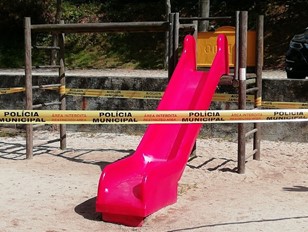
Credits. Fernanda de Castro and Maria Manuel Baptista
Figure 3 Maia ecotrail, March 16, 2020, under the state of emergency (first general confinement)
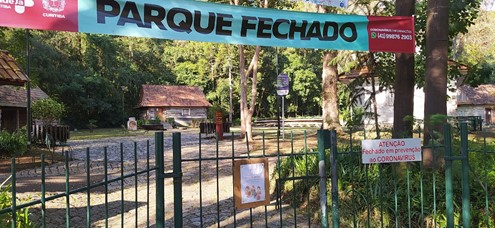
Credits. Simone Rechia
Figure 4 Bosque do Papa (Curitiba), July 2020, orange flag (medium risk of COVID-19 contagion)
In Curitiba, faced with the worsening of COVID-19 and the impending lack of beds in the healthcare network, the Curitiba Prefecture extended the restrictions on activities in the capital: only essential activities such as supermarkets, bakeries, and gas stations continued to operate, with restricted hours and a requirement to comply with the Health and Social Responsibility Protocol; under a red flag on the alert level, activities in the city parks were vetoed and suspended, as well as classes in the education system; consumption of alcoholic beverages was forbidden in public spaces (Decreto N.º 565, 2021).
Bodies become hostages to medical technological extensions (Deleuze, 1992; Haraway, 2018; Haraway et al., 1985/2009) that determine a greater influence of medicine in public and private spaces (Foucault, 1976/2010b). If, for Foucault, the body is, in the 18th and 19th centuries, historically constructed and a result of the convergence and intersection of various discursive practices of a disciplinary nature (Foucault, 1979/1998; 1975/2002, 1994/2006), for Deleuze (1992), in modern times, the body becomes a source of technologically obtained and socially controllable and monitorable data.
According to Deleuze (1992), the modern control society has created subjects who are controlled by the data their bodies produce, a more effective and refined form of control and surveillance than the disciplining and docilization of bodies carried out by a society of discipline, as theorized by Foucault (1979/1998). For Deleuze, individuals were transformed into sources, samples, markets, or (data) banks, operating with technological energy machines that feed capitalism, while the disciplinary Foucaultian man was a subject who made use, in the 18th and 19th centuries, of simple machines and lesser or almost zero technological demand. Thus, these modern bodies, which are, in part, no longer docilized, constitute themselves as sources of information (Deleuze, 1992), digitized and dated. Indeed, it is impossible to think of control societies without the Foucaultian contribution of disciplinary societies precisely because control arises from the articulation between discipline and biopolitics (Deleuze, 1992). The deepening of knowledge of the society of control is born, together with Foucault’s contributions, from a context in which the exponential development of new technologies is verified, a new weapon capable of generating, storing data, and managing, manipulating, and controlling subjects.
In the 19th century, capitalism was based on concentration, production, and ownership, the factory was the privileged working space, and the capitalist was the owner of the means of production. In the 21st century, with the pandemic and technological resources serving the market, the “factory” or the static locus of work is deterritorialized to the domestic environment. Control, unlike discipline, deterritorializes and radiates its power in streams, enhancing the control over subjects from anywhere: technological control is thus the new means through which power is executed (Deleuze, 1992).
In this sense, the pandemic allowed for a gradual installation of a new system of remote work, which is a system of control, docilization, surveillance, and domination of technologically mediated bodies, feeding the possibility that, even after the pandemic, this mode of production is normalized. Indeed, fear, insecurity, and instability lead individuals to accept conditions and control measures that jeopardize their privacy, not questioning who controls and under what security conditions the biometric data of their bodies is stored - as it happens, for example, with COVID-19’s mobile monitoring applications or databases created for this purpose. In fact, measures to control and combat COVID-19 are based on and depend mostly on technology, strongly articulated with methods of monitoring citizens.
In this sense, and for Deleuze (1992), control societies are no longer based on structures that favor a particular physical space but on mobile spaces, flows, ways, and environments of technological surveillance, which are clearly articulated with the capitalist machine. With the pandemic, the contribution and proliferation of technologies that allow the surveillance and mediated production of subjects are undeniable.
Although Deleuze (1995) considers that control societies no longer operate through the physical confinement of subjects to a space (the enclosed space of discipline theorized by Foucault, 1979/1998), monitoring is now carried out through flows that cut across spaces, unrestricted. Moreover, through the continuous control of communication made possible by the development of technologies, the pandemic has provided an insidious articulation between the bodies’ production, control, and confinement to a domestic space that is seized and captured by the market and institutions.
In a pandemic context, an extreme and unprecedented situation in this generation, we are not facing an evolutionary transition from the disciplinary to the control society, as suggested by Deleuze (1992) and Foucault (1979/1998), but an insidious coexistence of both types of society. The individual is forced to self-discipline for the greater good or disciplined by the authorities and biopolitically and technologically controlled. In pandemic times, governments try to raise awareness and control individuals, evoking the example of the “good citizen” who abides by sanitary rules and measures, suggesting and advising self-discipline over their bodies.
During the time and stage of the pandemic, the body is temporarily dispossessed of exercising the right to movement. It may even be compulsorily confined, by decree, to the home or other facilities, for example, to reduce the risk of contagion and carry out the measures to prevent and combat the pandemic.
Rules for the protection of citizens’ individual and public health are established. Bodies, suspect and tending towards subversion, are sensitized on public roads by every means, including persecutory drones, to comply with the civic duty of mandatory confinement and physical distance (Resolução do Conselho de Ministros n.º 38/2020, 2020) within a “regime in which one of the purposes of state intervention is the care of the body, of bodily health, the relationship between sickness and health” (Foucault, 1976/2010b, p. 171).
Bodies find themselves in vicious, chaotic, anxiogenic, and cyclical rituals that involve constantly washing their hands, repeatedly putting the mask on their faces, wearing gloves, paying uninterrupted attention to physical touch, and distancing from it. It is not just a matter of discipline that is imposed on the body by the central and governing power, but also of a process of self-control and memory almost machinic but necessary: the body is public and political, even and above all, in the pandemic (Butler, 1990). In this way, the body is regulated by central power and by the subject in a kind of shared biopower responsibility (Foucault, 1979/1998) or biotechnopower (Haraway, 1997). While rejecting the order, the body consents to it by necessity, survival, and, above all, the fear which makes it docile. According to Foucault’s conception, it is a kind of biopower and docilization of bodies and minds, of disciplinary techniques, controls, and powers over behaviors (Foucault, 1979/1998, 1975/2002, 1994/2006). We are witnessing control over life and (self)policing of the pandemic body, as it constitutes a transmitter agent or threatened or threatening body.
5. Monitoring Bodies
Looking at the monitored body makes us think about the interdict, which, for Certeau (1980/1994), is unsayable but visible, clarifying the parallels, transfers, and tensions between urban realities in Brazil and Portugal. The crisis triggered by the COVID-19 pandemic made us realize the importance of the relationship between the public and private spheres in our lives.
For Eva Illouz (as cited in Rodríguez, 2021), “the house without the public sphere” can become an “extremely oppressive” experience (para. 1). The author suggests that we design our homes not so much for a living but “as a place, we come back to” (para. 2). Illouz emphasizes that this relationship generates “these forces (that) make us what we are: both inside and outside our homes, we are who we are because we participate in a public culture” (para. 21). Therefore, this crisis revealed to us that we are sociable beings because, from social distancing, we noticed the impossibility of replacing face-to-face meetings with virtual ones for a long time. The search today is for more spaces for sociability, for more leisure.
These situations question the conceptions of life and how to live in large urban centers. There is a necessary sanitary control, which includes controlling leisure spaces and forbidding their enjoyment. However, there does not seem to be any control or regulation of the working hours of essential workers and the teleworking regime. There is no balance; the scales are tipped for the economy, but only to some sectors of society. Such aspects generate a movement of risk exposure in both dimensions, mainly through the desire for life in society because if their lives and bodies are for work, they are also for leisure. Thus, we live in the tension between adopting the official isolation decrees or resisting, seeking loopholes and tactics to take care of ourselves, others, and the place we live. It is a tension between two poles: enjoying leisure time and space in riskier or in less risky situations? Work or take a risk? Eat or die?
We believe these are not choices but biological, social, and economic needs. “Obligations” are all that some have left - those without digital access, without access to education, health, housing, or favorable economic conditions, which in Brazil represent the majority. Under a discourse of “stay home and only go out to consume and work”, the state’s guidance to communities has operated, to borrow a term from Certeau (1980/1994), as “bricolage”, for citizens adopt some of the guidelines, adapt, discard and reinvent others.
Perhaps the subject does not submit but synthesizes and subverts order, making a change of place, that is, from a passive subject, receiver of messages, to an active subject that establishes the bricolage; that operates with various information it receives and produces something new, therefore, of the individual subject - the “unsubmissive subject” in leisure time and space (Certeau, 1980/1994).
It is worth noting that the most vulnerable people, who cannot consume the “amusements”, subvert this order by seeking leisure experiences in the ways accessible and possible to them and, little by little, expand from the home to public spaces. We must consider that the houses of the most vulnerable people in Brazil are not appropriate housing. Many Brazilian families live in small, overcrowded rooms, without basic sanitation, far from large urban centers, and with no minimum living conditions. Furthermore, confinement within domestic spaces has increased the recurrence of other social problems linked to the risk of death, such as suicide and domestic violence (Marques et al., 2020).
Another alarming factor in the living conditions of Brazilians is revealed by data from the Brazilian Institute of Geography and Statistics (BRK Ambiental, 2018): only 41.5% of Brazilian municipalities benefited from the National Basic Sanitation Plan in 2017. This reality exposes the lack of planning with effects on public health. According to the Brazilian Institute of Geography and Statistics, one in three municipalities registers the occurrence of epidemics or endemics caused by the lack of basic sanitation.
We observed that the municipal decrees of the city of Curitiba demand social isolation, name teleworking as an alternative, and prohibit leisure experiences in public spaces. Such guidelines aim to deter displacements so as to avoid agglomerations, which is not possible for the most economically vulnerable, for they have activities that cannot be performed remotely (essential services). In the surroundings of houses, in socially vulnerable neighborhoods, there are no spaces qualified for experiences in the context of leisure time/space.
COVID-19 thus generated the aggravation of an already existing crisis in the country. Its consequences revealed the extremely high social inequality in some regions where isolation is practically impossible. Such reality unveils and highlights necropolitics in places of high social vulnerability, with effects on Brazilian society, for we are confronted with the existence of several worlds within a single country.
In this already chaotic scenario, there is also a debate, similar to the Portuguese scenario, about what the priority policy should be at this moment: saving lives or saving the economy. Thus, in Brazil, despite the monitoring of “some” bodies - the monitorable ones - Brazilians play the cards they have, with the possible insubordination, with “everyday rhetoric and practices that are equally definable as manipulations internal to a system, that of language, or that of an established order” (Certeau, 1980/1994, p. 80). Branded in the interstices of the time between strategies, cultures, bodies, and decrees.
6. (A)Live Bodies Under COVID-19: Subversive Bodies and (De)oppression
Within the pandemic context of total confinement of bodies, leisure was configured and appead, not only as an imperative and indisputable need but also as a right that, as seen in the pictures we collected, was claimed through the invasion and re-appropriation of public space (Figure 5 and Figure 6) by individuals, eager for mobility and freedom during the state of emergency and in the state of calamity, in which there were strong restrictions on the use of spaces intended for the practice of physical exercise.
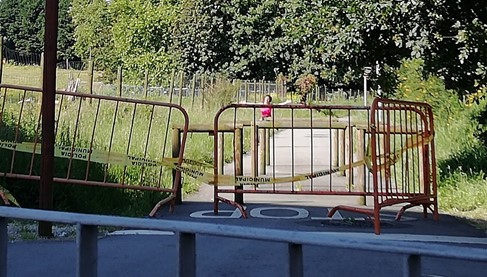
Credits. Fernanda de Castro
Figure 5 Maia ecotrail, March 17, 2020, in a post-state of emergency and under the state of calamity
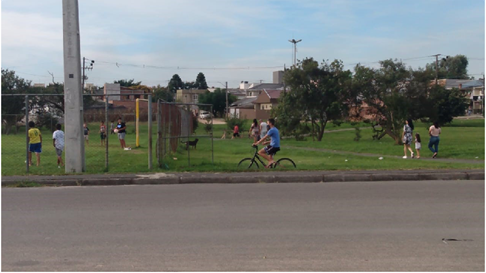
Credits. Bruno David Neca Rodrigues
Figure 6 Square in Tatuquara Neighbourhood (Curitiba), March 2020, under the red flag (high risk of COVID-19 contagion)
In fact, in the pre-pandemic period, we often heard reports about the high dependence on technology among young people, the excessive time spent by children on video games and the computer, the social interactions in cafes and restaurants where both the children and adults spent most of the time in silence, staring at mobile phones or tablets screens, on a broken and technologically mediated face-to-face communication.
With the COVID-19 pandemic, technology is no longer just a voluntary and optional resource. It necessarily became a constantly present resource in the lives of individuals, without any breaks, contributing to the implementation of a different paradigm and organization of labor than what was previously in place. Teleworking, a technological way of life, relegated and led to a reconfiguration of time and labor, leading workers to toxic productivity, with risks of exposure to long working hours without regulation and psychological and sociability implications (Agência Europeia para a Segurança e Saúde no Trabalho, 2021; Durães et al., 2021): “it is mandatory to adopt a teleworking regime, regardless of employment status, whenever the functions in question allow it” (Resolução do Conselho de Ministros n.º 38/2020, 2020, p. 7).
After all, the promised technological future assured less physical effort and even less emotional commitment to technological development. Fiction fueled our imagination, promising flying cars, and teleportation, among other technological wonders. Our gift was teleworking from a domestic context, which brought about ailments of equal viral severity: less humanity; less social contact; machining function beyond the reach of the info-excluded workforce; obesity; muscular, nervous, and cervical problems; extension of time at work; family conflicts; physical and bodily tension in the, sometimes minimal, domestic space; aggravated pressure, violence and family and emotional stress through the concentration and lingering of individuals within the same home for 24 h, 7 days a week.
Physical exercise, teleworking, classes, family life, and housework took place in the same space, within the same walls. That led minds and bodies to exhaustion, often not only due to confinement but also to the technological dependence in order to be and exist: “physical activity can be good for you and your family. Look for online classes that help you exercise at home” (Direção-Geral da Saúde, 2020a, p. 9). With the pandemic, power relations at the heart of the home were articulated with a technocratic way and organization of life, where biopolitics, as a regulatory mechanism, is influenced by economic, neoliberal, and capitalist dynamics, often with a raise of awareness regarding a pandemic duality: life/health or the economy? What is more important?
We believe these facts have led to the results we obtained when taking pictures in public space: a subversive claim for leisure as a necessity and a right, even overcoming the obligation to comply with government measures. The desire to eliminate physical limitations and the technological and symbolic elements that imprison bodies is visible: confinement in the garbage, no order to stop will be fulfilled (Figure 7 and Figure 8).
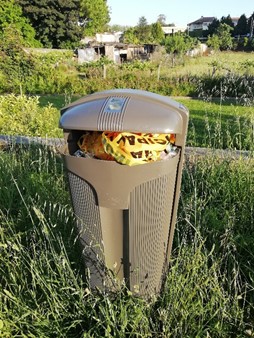
Credits. Fernanda de Castro and Maria Manuel Baptista
Figure 7 Maia ecotrail, May 17, in a post-state of emergency period and under the state of calamity
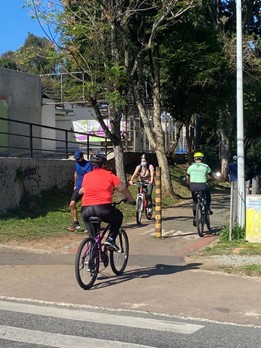
Credits. Simone Rechia
Figure 8 Crowded bicycle path in the surroundings of São Lourenço Park (Curitiba), June 2021, under the red flag (high risk of COVID-19 contagion)
During the first and second general confinements, we were on-site witnesses to disruptive practices, practices that subverted the order imposed, and performances of resistance to the state of emergency, which decreed the temporary closure of sports and leisure spaces in the two countries in question. That measure aimed at preventing the spread of the disease that necessarily implies control over the freedoms and mobility of bodies through controlled, domiciled, and domesticated performances (Foucault, 1979/1998).
Despite the permission to go on short hygienic walks within the area of residence during the state of emergency, the truth is that ecotrails, Maia ecotrail included, the parks and bicycle paths of Curitiba, were closed off to the public to avoid agglomerations.
Although disregard of measures would result in incurring the crime of disobedience, the fact is that, for several days, we saw insubordinate bodies with a subversive potential, a month after the state of emergency was declared, particularly in April and May. They resisted the order and reconquered, reappropriated, and reterritorialized themselves (Deleuze & Guattari, 1980/1997) in the public space, often violently challenging the discipline imposed on their bodies (Foucault, 1979/1998, 1976/2010b). We even witnessed the Sisyphean intervention of the authorities, that closed ecotrails, parks, and gardens daily and continuously in an attempt to control the possible agents of disease transmission that yearn for mobility and the return to a supposed “normality” and, therefore, defy the state and the order imposed (Figure 9 and Figure 10).
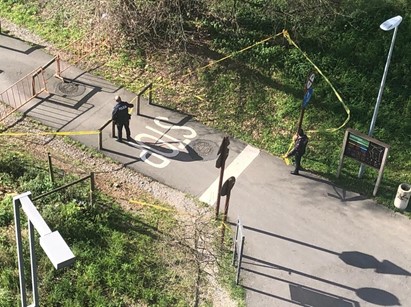
Credits. Maria Manuel Baptista
Figure 9 Maia ecotrail, February 14, 2021, under the state of emergency (second general confinement)
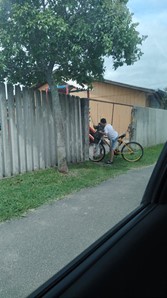
Credits. Gabriela Resende Cardoso
Figure 10 Children entering a closed school in Tatuquara Neighbourhood
These images portray a very sneaky and creative disobedience to the prohibitions and social norms, which break with imposed barriers (Certeau, 1993/1995). Despite incurring the crime of disobedience within the dynamics of discipline and punishment, the (dis)obedient, docile, domesticated, and medicalized bodies (Foucault, 1979/1998, 1976/2010b) did exercise, walks, or nature contemplation into political resistance. For these subjects, all subterfuges are valid to circumvent the law and make the exception rule, including individuals eager for movement who simply walk on a leash, rent, or borrow animals for hygienic walks (Dias, 2021).
Every other day, the tapes and barriers that detained bodies at the entrance of Maia’s ecotrail and in public spaces in Curitiba were torn down or knocked down and then put back to be subverted again by the body, which needs outdoor space and leisure time. In Maia and Curitiba, order, the imposition of discipline, and obedience were challenged:
any act of active or passive resistance exclusively directed at legitimate orders issued by the competent public authorities in the execution of this state of emergency is prohibited, and its authors may, under the law, incur a crime of disobedience. (Decreto-Lei n.º 17/2020, 2020, p. 30)
“Disobedience to the legitimate orders of the competent authorities, when practiced during the term of the calamity situation and in violation of the provisions ( ... ) constitutes a crime and is sanctioned under the terms of criminal law” (Resolução do Conselho de Ministros n.º 33-A/2020, 2020, p. 12).
Even though pandemic bodies internalize discourses of power (Foucault, 1979/1998), these bodies perform practices of resistance and subversion, giving concrete and vital importance to leisure in a relevant political and performative praxis (Baptista, 2016; Figure 11 and Figure 12).
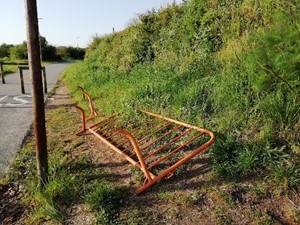
Credits. Fernanda de Castro and Maria Manuel Baptista
Figure 11 Maia ecotrail, April 27, 2020, under the state of emergency (first general confinement)
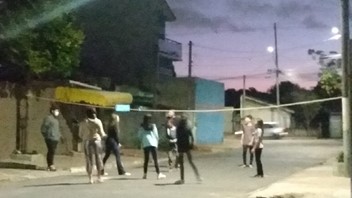
Credits. Bruno David Rodrigues Neca
Figure 12 Teenagers playing volleyball on the street in Tatuquara Neighbourhood (Curitiba), March 2021, under the red flag (high risk of COVID-19 contagion)
Adapting to norms, which (Certeau, 1980/1994) are called strategies, also generates “tactics” and “cunning” used by subjects to produce new ways of dealing with the norms imposed upon them. That is manifested, for example, in creating a new way to play or use the town’s structures (streets, lawns, walls, stairs) due to any ban. In this sense, these creations are forms of subversion to the orders imposed in the appropriation of space.
Although it was possible to exercise during the state of emergency near home, a fundamental activity for the body and mind, the pictures reveal that these bodies need the specific locus of exercise, the ambiance that offers and redirects a certain context of normality of the pre-pandemic daily life: a false sense of normality and freedom. In practice, the response of these bodies consisted in transgressing the sanitary norms symbolically inscribed on the barriers and tapes of social restraint.
In fact, it should be noted that short physical exercise was one of the activities allowed under the state of emergency and did not require the mandatory use of a mask. Dispossessing the mask through physical leisure provided the possibility of being and feeling the body without ties and technological extensions (masks, gel alcohol, gloves, or mobile applications; Deleuze, 1992; Haraway et al., 1985/2009), which censor and watch over human performances in the context of leisure, and soon return to the body after exercise.
This resistance to the inertia of bodily movement is not the only “art of the weak”; that is, “in the order organized by the power of knowledge, deviant practices (coups, trampolining, games, tales) are always possible” (Certeau, 1980/1994, p. 90).
7. Final Considerations
The COVID-19 pandemic and its disastrous consequences are a unique opportunity to understand leisure dynamics in the urban environment and the processes and mechanisms that normalize, operate, and reinforce the methods of technological control over bodies. The theoretical and epistemological means of Foucault (1979/1998, 1996/1999, 1975/2002, 1994/2006, 2010a, 1976/2010b), Deleuze 1992, 1995), Certeau (1980/1994, 1993/1995), Haraway (1997, 2018), Braidotti (2020) and Mbembe (2003/2018) seem particularly pertinent and sharp for thinking about current pandemic times.
The measures implemented in Portugal and Brazil by the central power during the pandemic period are expressions of public and political power with the clear goal of regulation, control, and discipline over bodies (Foucault, 1979/1998, 1976/2010b) in the face of an unknown biological enemy and for the benefit of the community. In this sense, leisure, a deeply human activity, and until today, under the symbolic yoke of laziness and loitering, seems to emerge and gain, with the pandemic, new meanings in society. In other words, it led subjects to act against the law and in favor of leisure as a necessity, right, and resistance. This learning, permeated by an intense and temporally long process of awareness, is carried out through the body that impels and stimulates the subjects to practices that challenge the (sanitary and politically imposed) order and the law.
In this study, we highlighted a clear and undeniable theoretical and empirical articulation between the observed performances, the gradation or progression of the subversion of bodies within the public space, and in close correlation with the temporal progression, the pandemic policies and the theoretical exploration of concepts and themes related to biopolitics/biopower, biotechnopower and necropolitics (Braidotti, 2020; Deleuze, 1992; Foucault, 1979/1998, 1996/1999, 1975/2002; Haraway, 1997, 2018; Haraway et al., 1985/2009; Mbembe, 2003/2018).
Regarding leisure, these thirsty bodies went through a process that goes from passivity and indifference to subversion: they are bodies with subversive power in their appropriation of leisure space, initiating, in this sense, a relevant political and performance praxis (Baptista, 2016). Raising the flag of leisure is, for these bodies, an attempt to recover and claim back their world, the freedom and “normality” they formerly enjoyed, even if it means acting against the law. It is also a fight for the right to the city, including the appropriation of public spaces, considering them the pulse of urban life, for it is through them that the link between active participation and life in urban centers is established (Rechia, 2018).
More than producing answers, it is important for us to reflect and interrogate an unprecedented and troubling period that has drastically altered daily life, causing subjects, in the tension between their rights and duties/limitations to come and go, to perform disruptive and infringing practices in the light of the norm, as verified in the data collected in the parks. It seems decisive, under the lens of cultural studies, to question and reflect on the changes in the dynamics of leisure in public spaces, not only during the pandemic but also in a post-pandemic context, enjoying, in the future, a necessary distance, but with power in the context of sociability and the exercise of citizenship.
For Certeau (1980/1994), the tactical combat against the productive and social order takes place between the weak (the “ordinary” subject) and the strong, even if the weak do not cease to build, rebuild and produce their culture, from an active resistance by their moving bodies in the urban environment. The possibility of thinking about the world from another economy is crucial, where subjects do not define themselves solely based on their job or the basis of the capitalist and neoliberal market.
Santos (2005) warns us that if “we wish to escape the belief that this world thus presented is true, and do not want to admit the permanence of its misleading perception, we must consider the existence of another possible world” (p. 20), where the exercise of leisure rights have a prominent place in public policies in Brazil and Portugal.
What will be left of this pandemic experience in a post-pandemic world? What are the implications of returning to the long-awaited “normality”? What will be the place of technology in our lives? Will return to normal mean forgetting or belittling all the practices we experienced psychologically and bodily during the pandemic? Will there be time, space, and opportunities for reflection on leisure as an effective right that goes beyond the right to leisure only for those who are part of the labor market?
Acknowledgments
We acknowledge the Study and Research Group in Leisure, Space, and City, at the Federal University of Paraná, in the person of Bruno David Neca Rodrigues and Gabriela Resende Cardoso, for providing some of the captured pictures which are included in the article.
This work is supported by national funds through FCT - Fundação para a Ciência e a Tecnologia, I.P., under project UIDP/04188/2020 (programmatic funding). We thank the Fundação para a Ciência e a Tecnologia and the Center for Languages, Literatures and Cultures, University of Aveiro, for the funding obtained for the production and translation of this scientific article. The first author acknowledges the support of the FCT un- der the scope of a PhD grant (SFRH/BD/124507/2016).
REFERENCES
Agência Europeia para a Segurança e Saúde no Trabalho. (2021, 22 de outubro). Teletrabalho e riscos para a saúde no contexto da pandemia de COVID-19: Dados recolhidos no terreno e implicações políticas. https://osha.europa.eu/pt/publications/telework-and-health-risks-context-covid-19-pandemic-evidence-field-and-policy-implications [ Links ]
Alpha, beta, gamma. Alfabeto grego passa a designar variantes do coronavírus. (2021, 31 de maio). TSF. https://www.tsf.pt/mundo/alpha-beta-gamma-alfabeto-grego-passa-a-designar-variantes-do-coronavirus-13789877.html [ Links ]
Baptista, M. M. (2016). Estudos de ócio e leisure studies - O atual debate filosófico, político e cultural. Revista Brasileira de Estudos de Lazer, 3(1), 20-30. https://periodicos.ufmg.br/index.php/rbel/article/view/517 [ Links ]
Bardin, L. (2007). Análise de conteúdo (L. A. Reto & A. Pinheiro, Trads.; 4.ª ed.). Edições 70. (Trabalho original publicado em 1977) [ Links ]
Biden condena ódio contra asiáticos: “O nosso silêncio é cumplicidade. Não podemos ser cúmplices”. (2021, 20 de março). Público. https://www.publico.pt/2021/03/20/mundo/noticia/biden-condena-odio-asiaticos-silencio-cumplicidade-nao-podemos-cumplices-1955255 [ Links ]
Bonalume, C. (2020). O lazer das mulheres na mesa de negociações: Cartografando o lazer em movimentos sociais de mulheres brasileiras (Tese de doutoramento, Universidade de Minas Gerais). Repositório Institucional da UFMG. http://hdl.handle.net/1843/34907 [ Links ]
Braidotti, R. (2020). O inumano: Vida além da morte (B. Coutinho, Trad.). In M. M. Baptista & F. Castro (Eds.), Género e performance: Textos essenciais 3 (pp. 31-73). Grácio Editor. [ Links ]
BRK Ambiental. (2018). Nova pesquisa do IBGE reforça relação entre saúde e saneamento básico. https://www.brkambiental.com.br/nova-pesquisa-do-ibge-reforca-relacao-entre-saude-e-saneamento-basico [ Links ]
Butler, J. (1990). Gender trouble: Feminism and the subversion of identity. Routledge. [ Links ]
Castilho, D. R., & Lemos, E. L. de S. (2021). Necropolítica e governo Jair Bolsonaro: Repercussões na seguridade social brasileira. Revista Katálysis, 24(2), 269-279. https://doi.org/10.1590/1982-0259.2021.e75361 [ Links ]
Certeau, M. (1994). A invenção do cotidiano: 1. Artes de fazer (E. F. Alves, Trad.). Vozes. (Trabalho original publicado em 1980) [ Links ]
Certeau, M. (1995). A cultura no plural (E. A. Dobránszky, Trad.). Papirus. (Trabalho original publicado em 1993) [ Links ]
Coelho, L., Vieira, C. C., Lopes, M., Ribeiro, R., & Ramos, L. M. (2021). Mulheres e homens em tempo de pandemia. Trabalho, rendimento, condições de vida (Relatório, Universidade de Coimbra). Estudo Geral. http://hdl.handle.net/10316/99763 [ Links ]
Constituição da República Federativa do Brasil de 1988 (1988). http://www.planalto.gov.br/ccivil_03/constituicao/constituicao.htm [ Links ]
Constituição da República Portuguesa. Decreto de Aprovação da Constituição, Diário da República n.º 86/1976, Série I de 1976-04-10 (1976). https://dre.pt/dre/legislacao-consolidada/decreto-aprovacao-constituicao/1976-34520775 [ Links ]
Correia, A. M. (2021, 16 de março). “Volta para Wuhan, p**a, e leva o vírus contigo”: Ataques de ódio contra asiáticos disparam nos EUA. Expresso. https://expresso.pt/internacional/2021-03-16-Volta-para-Wuhan-pa-e-leva-o-virus-contigo-ataques-de-odio-contra-asiaticos-disparam-nos-EUA-6fc4bc2f [ Links ]
Da “gripezinha” à imunidade do brasileiro: Dez momentos em que Bolsonaro desvalorizou a covid-19. (2020, 7 de julho). Público. https://www.publico.pt/2020/07/07/mundo/noticia/gripezinha-imunidade-brasileiro-dez-momentos-bolsonaro-desvalorizou-covid19-1923479 [ Links ]
Declaração Universal dos Direitos Humanos, 10 de dezembro, 1948, https://dre.pt/declaracao-universal-dos-direitos-humanos [ Links ]
Decreto n.º 2-A/2020, de 20 de março, Diário da República n.º 57/2020, 1º Suplemento, Série I de 2020-03- 20 (2020). https://dre.pt/dre/detalhe/decreto/2-a-2020-130473161 [ Links ]
Decreto Nº 421, de 16 de março de 2020, Diário Oficial Eletrónico do Município de Curitiba (2020). https://mid.curitiba.pr.gov.br/2020/00301049.pdf [ Links ]
Decreto Nº 520, de 9 de março de 2021, Diário Oficial Eletrónico do Município de Curitiba (2021). https://mid.curitiba.pr.gov.br/2021/00311495.pdf [ Links ]
Decreto Nº 565, de 12 de março de 2021, Diário Oficial Eletrónico do Município de Curitiba (2021). https://mid.curitiba.pr.gov.br/2021/00311717.pdf [ Links ]
Decreto-Lei n.º 17/2020, de 23 de abril, Diário da República n.º 80/2020, Série I de 2020-04-23 (2020). https://data.dre.pt/eli/dec-lei/17/2020/04/23/p/dre/pt/html [ Links ]
Decreto-Lei n.º 20-A/2020, de 6 de maio, Diário da República n.º 88/2020, 1º Suplemento, Série I de 2020- 05-06 (2020). https://data.dre.pt/eli/dec-lei/20-a/2020/05/06/p/dre/pt/html [ Links ]
Deleuze, G. (1992). Postscript on the societies of control. October, 59, 3-7. [ Links ]
Deleuze, G. (1995). Negotiations: 1972-1990 (M. Joughin, Trad.). Columbia University Press. [ Links ]
Deleuze, G., & Guattari, F. (1997). Mil platôs: Capitalismo e esquizofrenia (A. G. Neto & C. P. Costa, Trad.; Vol. 5). Editora 34. (Trabalho original publicado em 1980) [ Links ]
Dias, T. M. (2021, 19 de janeiro). Há pessoas que alugam animais para poderem sair à rua, diz autarca de Barcelos. Público. https://www.publico.pt/2021/01/19/local/noticia/covid19-autarca-barcelos-relatos-aluguer-animais-sair-rua-1947029 [ Links ]
Direção-Geral da Saúde. (2020a, 16 de março). Orientação nº 010/2020. https://www.apsei.org.pt/media/apsei/COVID-19/orientacao10.pdf [ Links ]
Direção-Geral da Saúde. (2020b, 20 de agosto). Temas da saúde: Desconfinamento para espaços de lazer e desporto.Serviço Nacional de Saúde. [ Links ]
Doistua, R. (2006). Introducción a la historia de los estudios de ocio en el siglo XX. Cuadernos de Estudios de Ocio, (3), 1-87. [ Links ]
Durães, B., Bridi, M. A. da C., & Dutra, R. Q. (2021). O teletrabalho na pandemia da covid-19: Uma nova armadilha do capital? Sociedade e Estado, 36(3), 945-966. https://doi.org/10.1590/s0102-6992-202136030005 [ Links ]
Estados Unidos registam milhares de ataques a asiáticos durante a pandemia. (2021, 17 de março). G1. https://g1.globo.com/mundo/noticia/2021/03/17/estados-unidos-registram-milhares-de-ataques-a-asiaticos-durante-pandemia.ghtml [ Links ]
Foucault, M. (1998). Microfísica do poder (R. Machado, Trad.). Edições Graal. (Trabalho original publicado em 1979) [ Links ]
Foucault, M. (1999). Em defesa da sociedade: Curso dado no Collège de France (1975-1976) (M. E. Galvão, Trad.). Martins Fontes. (Trabalho original publicado em 1996) [ Links ]
Foucault, M. (2002). Vigiar e punir: Nascimento da prisão (R. Ramalhete, Trad.). Vozes. (Trabalho original publicado em 1975) [ Links ]
Foucault, M. (2006). Estratégia, poder-saber (V. L. A. Ribeiro, Trad.). Editora Forense Universitária. (Trabalho original publicado em 1994) [ Links ]
Foucault, M. (2010a). Crise da medicina ou crise da antimedicina. Verve, (18), 167-194. https://revistas.pucsp.br/index.php/verve/article/view/8646 [ Links ]
Foucault, M. (2010b). História da sexualidade: A vontade de saber (M. T. Albuquerque & J. A. Albuquerque, Trads.; Vol. 1). Edições Graal. (Trabalho original publicado em 1976) [ Links ]
Gorz, A. (2013). Bâtir la civilisation du temps liberé. Monde Diplomatique. [ Links ]
Guerra, I. (2010). Pesquisa qualitativa e analise de conteúdo. Sentidos e formas de uso. Principia Editora. [ Links ]
Hall, S. (2006). A identidade cultural na pós-modernidade (T. T. da Silva & G. L. Louro, Trads.). DP&A. (Trabalho original publicado em 1992) [ Links ]
Haraway, D. (1997). Modest_Witness@Second_Millennium.FemaleMan©_Meets_ OncoMouseTM. Routledge. [ Links ]
Haraway, D. (2018). A biopolítica dos corpos pós-modernos: Determinações do eu no discurso do sistema imunitário (M. J. Pereira, Trad.). In M. M. Baptista (Ed.), Género e performance: Textos essenciais 1 (pp. 179-195). Grácio Editor. [ Links ]
Haraway, D., Kunzru, H., & Tadeu, T. (Eds.). (2009). Antropologia do ciborgue: As vertigens do pós-humano (T. Tadeu, Trad.). Autêntica. (Trabalho original publicado em 1985) [ Links ]
Instituto Nacional de Estatística. (2021). Um ano de pandemia: Uma breve síntese: 2020-2021. INE. https://www.ine.pt/xurl/pub/436991959 [ Links ]
Kapur, S. (2020, 30 de setembro). 4 debate takeways from last night’s Trump-Biden face-off. NBC News. https://www.nbcnews.com/politics/2020-election/four-takeaways-first-trump-biden-debate-n1241527 [ Links ]
Lafargue, P. (2011). O direito à preguiça (A. J. Massano, Trad.). Teorema. (Trabalho original publicado em 1977) [ Links ]
Lopes, D. (2020, 31 de março). Um copo de vodka, sauna e trabalhar com trator no campo. Alexander Lukashenko, o último negacionista da COVID-19. Observador. https://observador.pt/2020/03/31/um-copo-de-vodka-sauna-e-trabalhar-com-trator-no-campo-alexander-lukashenko-o-ultimo-negacionista-da-covid-19/ [ Links ]
Marins, C., Porto, D., Baptista, S., & Espina, R. (2021, 2 de junho). Covid: Brasil registra 2.390 novas mortes e tem 6 estados em alta na média. Uol. https://www.uol.com.br/vivabem/noticias/redacao/2021/06/02/brasil-registra-2507-novas-mortes-por-covid-19-em-24-h-segundo-ministerio.htm [ Links ]
Marques, E. S., Moraes, C. L. de, Hasselmann, M. H., Deslandes, S. F., & Reichenheim, M. E. (2020). A violência contra mulheres, crianças e adolescentes em tempos de pandemia pela COVID-19: Panorama, motivações e formas de enfrentamento. Cadernos de Saúde Pública, 36(4), 1-6. https://doi.org/10.1590/0102-311x00074420 [ Links ]
Mbembe, A. (2018). Necropolítica: Biopoder, soberania, estado de exceção, política da morte (R. Santini, Trad.). N-1 edições. (Trabalho original publicado em 2003) [ Links ]
Mike Pompeo afirma que existem “imensas provas de que coronavírus vem de laboratório em Wuhan”. (2020, 3 de maio). Jornal Económico. https://jornaleconomico.pt/noticias/mike-pompeo-afirma-que-existem-imensas-provas-de-que-coronavirus-vem-de-laboratorio-em-wuhan-583752 [ Links ]
Nakamura, J., & Terao, S. (2021, 30 de maio). Brasileiros de ascendência asiática relatam ataques racistas durante a pandemia. Folha de S. Paulo. https://www1.folha.uol.com.br/cotidiano/2020/05/brasileiros-de-ascendencia-asiatica-relatam-ataques-racistas-durante-a-pandemia.shtml [ Links ]
Neca, B. R. & Rechia, S. (2020). Ficar em casa ou ocupar os espaços de lazer ao ar livre? Reflexões e possibilidades para uma apropriação segura dos diferentes espaços públicos de lazer em tempos de pandemia. Licere, 23(4), 471-509. https://doi.org/10.35699/2447-6218.2020.26703 [ Links ]
Rechia, S. (2018). O “menu” dos espaços e equipamentos de lazer e cultura oferecido pela cidade de Curitiba: Vida de qualidade ou qualidade de vida? Existe diferença? In D. S. S. Silva & J. V. P. da Silva (Eds.), Políticas públicas de lazer e esporte (pp. 157-188). Mercado de Letras. [ Links ]
Relembre frases de Bolsonaro sobre a COVID-19. (2020, 17 de julho). BBC News Brasil. https://www.bbc.com/portuguese/brasil-53327880 [ Links ]
Resolução do Conselho de Ministros n.º 33-A/2020, de 30 de abril, Diário da República n.º 85/2020, 3º Suplemento, Série I de 2020-04-30 (2020). https://data.dre.pt/eli/resolconsmin/33-a/2020/04/30/p/dre/pt/html [ Links ]
Resolução do Conselho de Ministros n.º 38/2020, de 17 de maio de 2020, Diário da República n.º 95-B/2020, Série I de 2020-05-17 (2020). https://data.dre.pt/eli/resolconsmin/38/2020/05/17/p/dre/pt/html [ Links ]
Rodríguez, M. (2021, 31 de maio). Maioria dos casais não aguenta intimidade constante sem a esfera pública, diz socióloga Eva Illouz. BBC News Brasil. https://www.bbc.com/portuguese/geral-56886733 [ Links ]
Salcedas, R. (2021, 17 de março). Ataque: Como um jovem de 21 anos matou oito pessoas em três spas asiáticos. Jornal de Notícias. https://www.jn.pt/mundo/oito-mortos-em-tres-tiroteios-em-casas-de-massagens-asiaticas-nos-eua-13466763.html [ Links ]
Santos, M. (2005). Por uma outra globalização: Do pensamento único à consciência universal (12.ª ed.). Record. [ Links ]
Schnapper, D. (2000). A compreensão sociológica: Como fazer análise tipológica (E. de Freitas, Trad.). Gradiva. (Trabalho original publicado em 1999) [ Links ]
Teixeira, A. L., Cerejo, D., Rosa, M. do R., & Lisboa, M. (2022). Effects of the COVID-19 pandemic on the lives of women with different socioeconomic backgrounds and victimization experiences in Portugal. Social Sciences, 11(6), Artigo 258. https://doi.org/10.3390/socsci11060258 [ Links ]
Trump volta a culpar China por “deixar a praga escapar” e troça de Biden por usar máscara. (2020, 23 de setembro). TSF. https://www.tsf.pt/mundo/-trump-volta-a-culpar-china-por-deixar-a-praga-escapar-e-troca-de-biden-por-usar-mascara-12750472.html [ Links ]
United Nations. (2020). Policy brief: The impact of COVID-19 on women. https://www.un.org/sites/un2.un.org/files/policy_brief_on_covid_impact_on_women_9_apr_2020_updated.pdf [ Links ]
World Health Organization. (2022a). European regional obesity report 2022. https://apps.who.int/iris/handle/10665/353747 [ Links ]
World Health Organization. (2022b). Scientific brief - Mental health and COVID-19: Early evidence of pandemic’s impact. https://www.who.int/publications/i/item/WHO-2019-nCoV-Sci_Brief-Mental_health-2022.1 [ Links ]
1More than 1 year after the appearance of COVID-19, the new SARS-CoV-2 variants were renamed by the World Health Organization in May 2021 precisely to avoid stigmatizing and discriminatory associations. References to the geographical locations where the variants and sub-variants were found are no longer used. They are now named using the Greek alphabet: alpha (British), beta (South African), gamma & zeta (Brazilian), delta & kappa (India), epsilon & iota (North American), theta (Philippine), eta (in several countries; Alpha, Beta, Gamma. Alfabeto Grego Passa a Designar Variantes do Coronavírus, 2021). Hate crimes (physical and verbal) against people of Asian origin increased exponentially, in the United States and Brazil (and all over the world), during the pandemic, due to the xenophobic, racist, hate speech and fanaticism by the former North American President Donald Trump and the Brazilian President Jair Bolsonaro, making China and, consequently, people of Asian origin responsible for the appearance and spread of the virus worldwide. Ignited by presidential speeches and tweets, the aggressors unleashed dozens of violent attacks (some fatal) against people of Asian origin, mainly Chinese and mostly women. They demonized and blamed them for the existence of COVID-19 (“Biden Condena Ódio Contra Asiáticos: ‘O Nosso Silêncio É Cumplicidade. Não Podemos Ser Cúmplices”, 2021; Nakamura & Terao, 2021; Salcedas, 2021). In response to the attacks, demonstrations were held, and a wave of resistance emerged on social media that viralized the #StopAsianHate hashtag. According to a report by the organization Stop Asian Americans and Pacific Islanders Hate, between March 19, 2020, and February 28, 2021, 3,795 hate crimes against the Asian-American community were reported in the United States, for example (Correia, 2021). In May 2021, the current United States president, Joe Biden, signed a law to strengthen the fight against hate crimes and racial violence. It promotes greater protection for citizens of Asian origin or descent in the face of the increased crimes against this community (Estados Unidos Registam Milhares de Ataques a Asiáticos Durante a Pandemia, 2021).
2In the words of Donald Trump, former president of the United States of America: “we built the greatest economy in history; we closed it down because of the China plague” (Kapur, 2020, para. 15).
Received: March 30, 2022; Accepted: May 24, 2022











 text in
text in 



